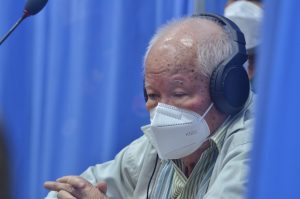The defense team for the former head of state of Cambodia’s brutal Khmer Rouge regime argued Tuesday that his genocide conviction should be overturned, calling into question evidence presented at his original trial before an international tribunal.
In the second day of Khieu Samphan’s appeal, attorney Anta Guissé told judges that evidence of killings of Vietnamese minorities in Cambodian border provinces Prey Veng and Svay Rieng was weak, and questioned whether the slayings rose to the level of genocide.
The 90-year-old defendant is the last living member of the top leadership of the Khmer Rouge, the radical communist regime that ruled Cambodia with an iron fist from 1975 to 1979 and was responsible for the deaths of an estimated 1.7 million people.
In a 2018 verdict from the Extraordinary Chambers in the Courts of Cambodia, Khieu Samphan was found guilty of genocide of the Vietnamese under the principle of joint criminal enterprise, under which individuals can be held responsible for the actions of a group to which they belong.
But Guissé argued that prosecutors had failed to prove genocide, saying they failed to “establish the massive character of the crime.”
She said, for example, that the court only heard from one witness about the Svay Rieng massacre, involving the killing of four Vietnamese families, who testified she had been “informed of these events, by people whose names she forgot.”
There is “lack of evidence because we didn’t know who the perpetrators were, we do not know who executed the families, and we also have uncorroborated hearsay,” Guissé told the ECCC’s Supreme Court chamber. “This is why in our appeals brief we concluded that acquittal was necessary for lack of evidence,” she said.
Khieu Samphan sat behind the French defense attorney as she addressed the court, listening to her arguments through headphones and wearing a mask in compliance with COVID-19 restrictions.
Megan Hirst, an Australian attorney representing victims of the Khmer Rouge, questioned the defense’s argument, telling the court that hearsay testimony is often necessary in such cases.
“The defense position, taken to its logical conclusion, seems to be that where killings are alleged a trial chamber requires eyewitness evidence to conclude that those killings occurred,” she said. “That position is at odds with common sense. When mass killings are organized in this way, there are often no survivors who can testify about their experiences.”
In addition to questioning the evidence, Khieu Samphan’s defense team is also arguing there were procedural mistakes made in the trial that also found him guilty of crimes against humanity and war crimes.
The defendant is scheduled to address the tribunal on Thursday, the last day of the four-day hearing on his appeal. A verdict is not expected until next year.
In their opening statements, prosecutors rejected the procedural arguments and emphasized the “totality” of the evidence against the defendant.
Even if the conviction is overturned, Khieu Samphan is already serving a life sentence after being convicted in 2014 of crimes against humanity connected with forced transfers and disappearances of masses of people. That conviction was upheld on appeal in 2016.
Under the leadership of the late Pol Pot, the Khmer Rouge sought to eliminate all traces of what it saw as corrupt bourgeois life, destroying most religious, financial and social institutions, and forcing millions out of cities to live in the countryside.
Dissent was usually met with death in the Khmer Rouge’s notorious “killing fields” or elsewhere, while starvation, overwork and medical neglect took many more lives.
Only when an invasion by Vietnam finally drove the Khmer Rouge from power in 1979 did the magnitude of the killings become truly known.
After being ousted from power in 1979, the Khmer Rouge waged guerrilla warfare for another two decades before disintegrating. Pol Pot died in the jungle in 1998, and on Christmas Eve that year, Khieu Samphan surrendered along with Nuon Chea, the movement’s chief ideologue.
Nuon Chea was considered Pol Pot’s right-hand man, while Khieu Samphan as head of state presented a moderate veneer as the public face for the highly secretive group.
Nuon Chea was convicted alongside Khieu Samphan in 2018 and died the following year.
The only other leader convicted by the panel has been Kaing Guek Eav, also known as Duch, who as head of the Khmer Rouge prison system ran the infamous Tuol Sleng torture center in Phnom Penh. He died in 2020 while serving a life prison term for war crimes and crimes against humanity.
After the conviction of Khieu Samphan and Nuon Chea in 2018, the government of autocratic Prime Minister Hun Sen, himself a mid-level Khmer Rouge commander before defecting while the group was still in power, declared no more cases would go forward, saying they would cause instability.

































